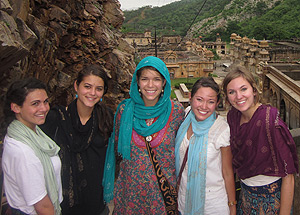The real India
On the crowded streets of Calcutta, communication professor Ananda Mitra, led his 11 “children” through the oceans of people using a balloon as a beacon. At dinner, Mitra’s wife, Swati Basu, sang a song in Hindi for the group. This might be a very large family on vacation — and in a sense it was — a family of Wake Forest students learning about India from the insider’s point of view.
“I’ll never have another opportunity to see India with professors who are natives of Calcutta,” says senior political science major Kendall Hack. “We did things tourists would not usually do and visited places tourists would not think to go.”
Mitra worked and planned for two years to develop a study abroad experience that would give students the opportunity to immerse themselves in Indian culture. The trip was part of his summer class, “Communication, Culture and Sustainability.”
“Because India will play a significant role in global business, politics and culture, it is critical for young people today to learn about India,” Mitra said. “It is a culture that will be very important in their professional lives.”
 Junior anthropology major Carrie Stokes says she couldn’t imagine the course being led by anyone other than Mitra and Basu. “Their openness and love was the key to forming, sustaining and mediating our ‘Indian Family,’ Stokes said. “Ananda and Swati pushed our group beyond the barriers of tourism and into the reality of what it means to be Indian.”
Junior anthropology major Carrie Stokes says she couldn’t imagine the course being led by anyone other than Mitra and Basu. “Their openness and love was the key to forming, sustaining and mediating our ‘Indian Family,’ Stokes said. “Ananda and Swati pushed our group beyond the barriers of tourism and into the reality of what it means to be Indian.”
“An absolutely fantastic set of individuals came together to create a learning community that exemplifies the ‘ashram’ system of teaching,” Mitra said of the group of students he led. “But not only the students changed—teaching will never be the same for me again.”
“More than anything else,” said Hack, “the trip taught me to do. We were encouraged to be curious about Indians’ lives, ask questions and build relationships. Since I’m interested in pursuing international relations and foreign service, I’m grateful that I better understand how to interact with and get to know people so entirely different from myself.”
Basu, who is a research professor in the physics department, said that although Winston-Salem is her family’s home now, she was excited to share the sights and sounds, both urban and rural, that are unique to her homeland. “The students were able to learn a great deal about life in this part of the world because India is very people-oriented.”
The students learned about Indian society from a Buddhist scholar and experts on the nation’s politics and business, while also exploring temples, palaces and a fish market.
Honking is what junior philosophy major Rachel Handel remembers. “In India, driving requires a completely different mindset, where honking is equivalent to saying ‘hello, I’m behind you,’ and the lines on the road don’t mean much when traffic patterns resemble Tetris. But we all grew immune to the chaos, and found ourselves dreading going home to America where driving would seem quite boring in comparison.”
Categories: Experiential Learning, Global Wake Forest, Mentorship, Research & Discovery, University Announcements
Media Contact
Wake Forest News
media@wfu.edu
336.758.5237



